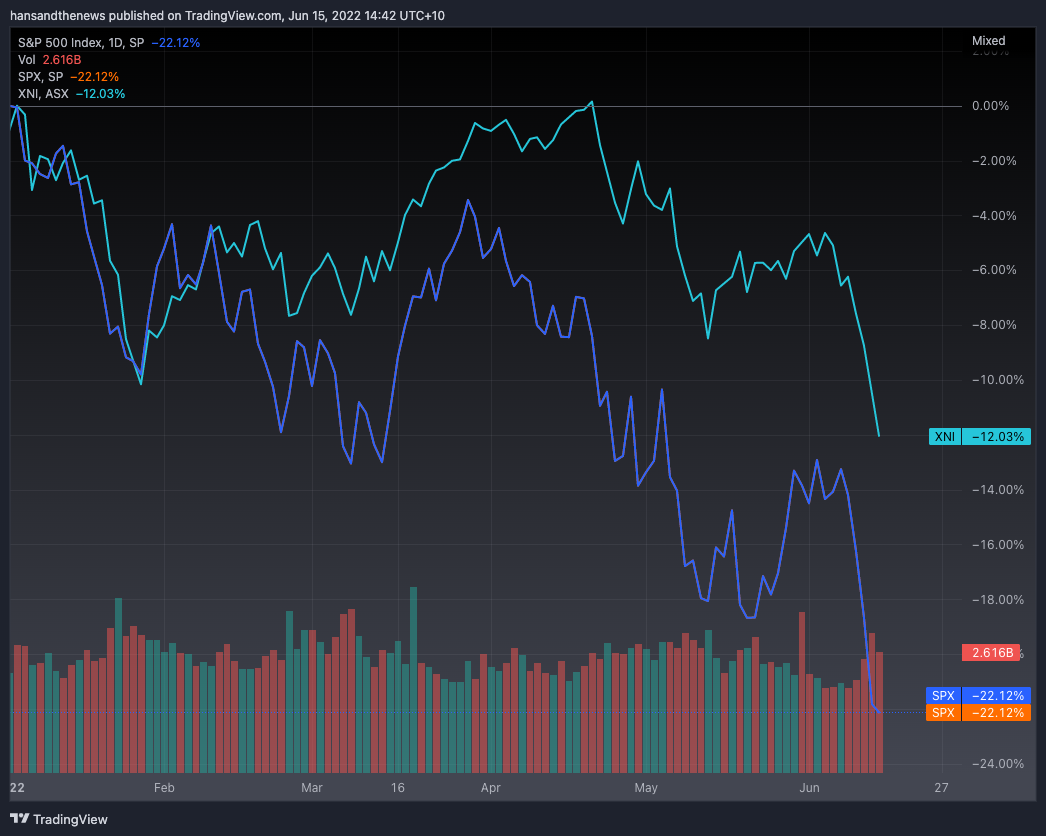Ben Clark and Charlie Viola on how to keep your head as market panic spirals
The US market officially tipped into bear market territory yesterday, the decline of the S&P 500 now pushing past 20% since the start of the year. The local market has fared slightly better, the S&P/ASX 200 down 13% in 2022 so far (as of Tuesday 14 June). But the 5% loss in early trade on Tuesday (after a public holiday Monday) spooked investors.
What does this mean for your portfolio and how should you respond? We’ve spoken to a couple of leading wealth managers for their insights.
“Like everyone else, we’re watching this rising inflation discussion continue and we’re wary about the selloff that’s going on, but at the same time, we’re also reasonably relaxed, says Charlie Viola, managing director at Pitcher Partners Wealth Management.
What’s behind this positive mindset?
“Most of our equity allocations are in large caps, in good quality companies with good cash flows, quality earnings, and good competitive advantages,” Viola says.
“We take a two-speed approach with our clients’ portfolios. We hold lots of very normal risk assets as mentioned above, but also have a reasonable array of real asset-style private assets in their portfolios, which tend to smooth out returns during periods of deep volatility like we’re seeing.”
How markets have performed year-to-date


Ben Clark, portfolio manager at TMS Capital, holds a similarly sanguine view.
“There’s a lot of things to worry about but there’s already been a significant correction in the market,” he says.
“It’s not like the issues we’re facing are unknown – it’s been part of the conversation for a year now. I feel like many of the concerns out there are well understood by the markets, which nine times out of 10, means they’re well and truly priced in.”
How they're currently positioned
Because of the diversity of the real asset holdings in the portfolios of Pitcher Partner clients, they mature at different times. And as Viola explains, this has been feeding cash back into the portfolios and left them with slightly higher cash allocations.
“With various private assets in our client portfolios, over time you have staggered maturity dates and redemption dates. So, the private debt or property investments we might have made 12-18 months ago are paying out cash we can redeploy into the equity market,” Viola says.
“Over the last three or four months, we’ve been deploying some of that cash into the weakness – and we certainly do see weakness in equity markets as an opportunity,” Viola says.
But he emphasises that, while happy to buy good quality companies with healthy balance sheets in the current weakness, he’s also keeping some of the powder dry. “Because if this dislocation continues, we don’t want to use it all up early on,” Viola says.
Viola says he and the team are always looking at both traditional and alternative assets. In Alternatives, that means good quality infrastructure, property and industrial assets.
“That gives us a good hedge to inflation. We’re looking to buy those assets but we’ve definitely got powder dry to buy into the weakness that we’re seeing,” Viola says.
TMS Capital’s Clark says he’s currently holding about the same amount of cash as usual.
“Our cash levels are in line with what we believe a client should hold in cash, based on their circumstances. They don't move around based on what we think markets are or are not going to do,” he says.
“Trying to predict short term market movements is a bit of a fool’s game. Particularly if you’re an investor with a 20 to 30-year time horizon, the data tells you that you only need to miss four or five key days in a 12-month period to wipe out 80% of the total year returns.”
The Growth opportunity
Clark regards the current selloff in equity markets as an opportunity for investors – particularly in finding a reasonably-priced entry point to buy higher-quality growth stocks. While noting the selling has become more broad-based in recent weeks to also hit banking, resources, and energy companies, he says these sectors are still off only around 10%.
“A lot of high-quality growth stocks are down at least 50% since 1 January. They’re, arguably, where you want to be in this uncertain environment, in companies that can grow between 10% and 30% regardless of what the economy does,” Clark says.
Clark says investors should focus on owning companies with:
- pricing power,
- strong balance sheets, and
- that can grow despite what the economy will (or won’t) do.
Clark is also looking for opportunities for clients beyond the equity markets. And in the current environment of rising bond yields, debt securities have become more attractive. This has seen Clark and his team increase their holdings of hybrid securities, subordinated notes, and bonds.
“We expect these assets can generate returns of between 6% and 6.5% over the next two or three years, by holding the debt of some very high-quality businesses,” he says.
These allocations have been primarily funded by drawing on existing cash reserves, helped by the draw-down Clark and his team have made to some of its real asset stocks in the last six months. Some of the companies he’s sold down over this period include Sydney Airport (ASX: SYD), telecommunications infrastructure company Spark Infrastructure (ASX: SKI) and motorways owner and operator Atlas Arteria (ASX: ALX).
Sectors and stocks that appeal currently
Asked to name some equity market sectors, Viola believes there’s no need to zero in on specific sectors – or even individual stocks – in this highly volatile period.
“In periods of deep dislocation like we’re seeing now – for example, you’ve got CBA off about 4% and BHP down more than 5% – so whether it’s in tech, the banks, or miners, the selloff is across sectors,” Viola says.
“On the way back into the market, buy the index. Rather than stock picking or trying to pick the right sector, just buy the whole index. When markets rebound, different areas will rebound at different paces, but it will occur across the board, so there is no reason to take stock-specific risks right now.”
High conviction on Quality remains undented
Some specific companies called out by TMS Capital’s Clark include:
- healthcare firm Resmed (ASX: RMD) and
- real estate portal REA Group (ASX: REA)
Both are stocks Clark has named as five-year stock picks in his interviews on Livewire’s Rules of Investing podcast. “Resmed is our second-largest holding and its share price was up yesterday,” he says.
.png)
“The market is now starting to focus more on economically sensitive businesses as it grows more worried about the economy and for me, the pain that we’re seeing in growth is something we see as an opportunity.”
One of TMS Capital's top 10 holdings currently, REA Group's share price is now down more than 40% since the start of the year.
“We’re obviously going to see a fair bit of pain in the property market and how sales volumes will react to that – there is uncertainty. But it’s still one of the highest quality businesses around,” he says.
“There are levers that the business can pull so that, if there is a short-term drop off in revenue, they can reduce their costs. And with its super clean balance sheet, it will grow through this period.
Some of his other top holdings include other high-quality growth firms CSL Limited (ASX: CSL), Seek (ASX: SEK), Macquarie Group (ASX: MQG) and Wesfarmers (ASX: WES).
“I’m not losing any sleep owning those businesses through this cycle – it’s not fun seeing the share prices lower than where they should be, but those companies will be significantly bigger from this point,” Clark says.
Advice for nervous investors
As long as you’re invested in good quality companies with good earnings and solid competitive advantages, Pitcher Partners’ Viola says the trick is to remain reasonably relaxed.
“Those companies won’t disappear overnight. And what better time to buy good quality companies than when they’re trading at a discount?” he says.
In summary, he urges investors to ensure they hold different risks in their portfolios. And offers a reminder that the whole point of holding cash is to deploy it when good value opportunities present.
“The key takeout is that diversity is really important. Make sure that over time, you have good quality portfolios made up of good quality assets,” Viola says. “The best time to buy that quality and to diversify your portfolio is during periods of weakness.
Over the last couple of years, he says it has made absolute sense to invest in real assets when equity markets haven’t shown much value. But Viola says this is reverting and he is now using this opportunity to buy back in.
“It may get worse and we might see markets draw down further, but that’s not to say this isn’t a reasonable entry point,” he says.
“Take a long-term view”
Echoing these views, TMS Capital’s Clark says it’s important not to focus too heavily on short-term market pricing that he believes often doesn’t make much sense,
“If you’re in high-quality growth businesses, you can take a long-term view. If you’re in speculative stocks you do need to be worried, because there are a lot of businesses that might never come back,” he says.
“But try not to react on a day-to-day basis, think truly five years ahead and stick to your plan.”
And for those who don’t have an investment plan, he says now is a good time to sit down and formulate one.
“If you focus on asset allocation, stick to it, don’t feel the need to go all-in on shares. because markets have fallen,” Clark says.
“But if your weighting to equities has dropped, now is probably a time to re-weight based on what you’re trying to achieve.”
Never miss an insight
If you're not an existing Livewire subscriber you can sign up to get free access to investment ideas and strategies from Australia's leading investors.
And you can follow my profile to stay up to date with other wires as they're published – don't forget to give them a “like”.
.jpg)
2 topics
9 stocks mentioned
1 contributor mentioned

